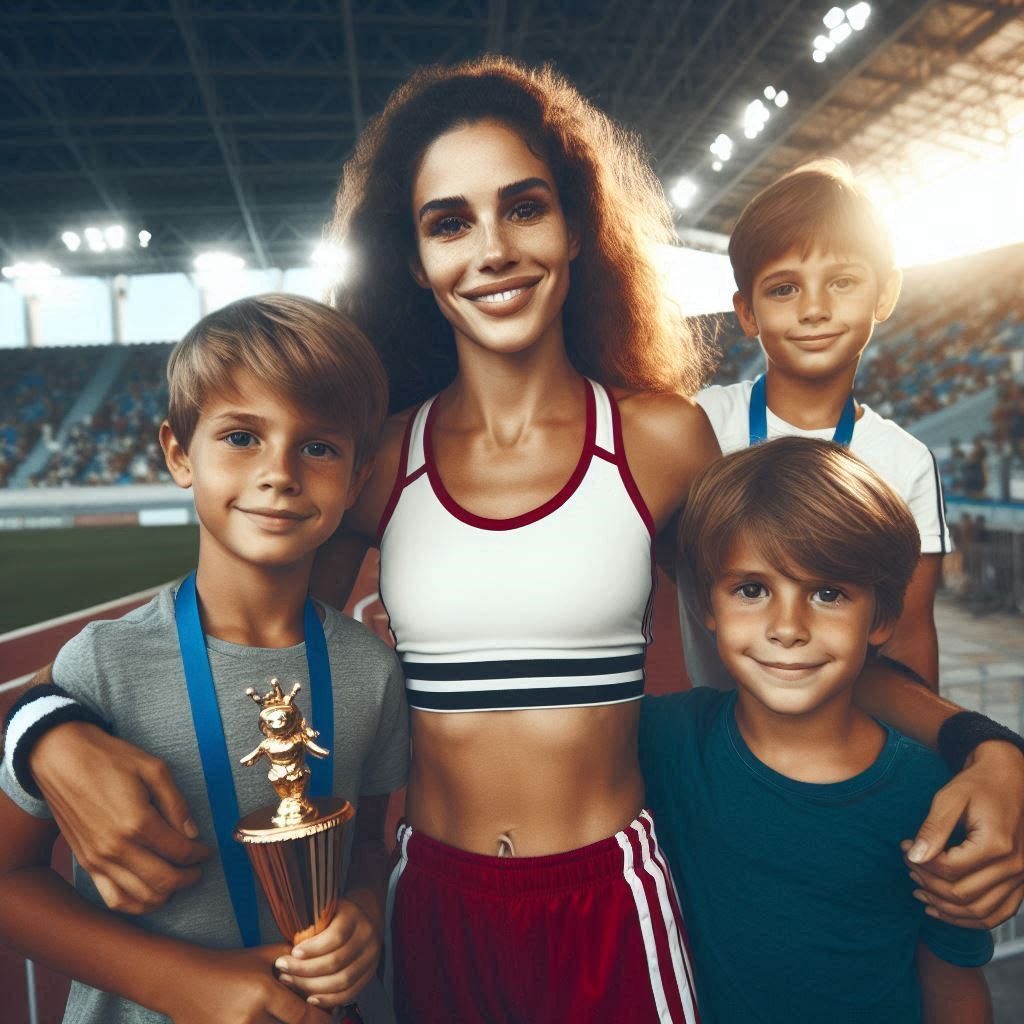Media Focus on Female Athletes Balancing Family
The Impact of Family on Professional Athletes
————————————————————
A Comparative Analysis Between Male & Female Athletes
Professional athletes often find themselves in the limelight, their every move scrutinized by fans and critics alike. Amidst this, one aspect that often goes unnoticed is the role their families play in their careers. The Media Focus on Female Athletes is a fine line between going to far or interesting.
This shows how having a family affects professional athletes.
This balance explores if the effects between male and female athletes in the media. Media Focus on Female Athletes differs from Male athletes but is it different?

Understanding the Role of Family in an Athlete’s Career
Family plays a crucial role in shaping an athlete’s career.
From the early stages of nurturing talent to providing emotional support during challenging times. Families are often the unsung heroes behind successful athletes. The difference between media focus on female athletes & male athletes should not be that different yet there is.
For professional athletes with families of their own, the dynamics change. They have to juggle between their demanding careers and their responsibilities as parents and spouses. This balancing act in sports can be stressful, and challenging but also rewarding. The joy and support derived from a loving family can be a source of motivation and strength.
The Impact on Male Athletes
In the case of male athletes, traditional societal norms often place the burden of being the primary breadwinner on them. This can add an extra layer of pressure to perform and succeed. However, having a family can also provide a sense of stability and purpose, driving them to excel in their sport.
Fatherhood, in particular, can have a profound impact. It can bring about a shift in priorities and perspective, often leading to a more balanced approach to their career. The support and understanding of their partners play a significant role in helping them manage their dual responsibilities.
The Impact on Female Athletes
Female athletes, on the other hand, face unique challenges. They often have to break societal stereotypes that question their ability to excel in sports while being mothers. Pregnancy and motherhood can also lead to career breaks, which can impact their performance and ranking.
However, many female athletes have shown that it’s possible to have a successful sporting career while being a mother. They often credit their success to the strong support system provided by their families. Their journey is a testament to their resilience and serves as an inspiration for many. The issue they face is the media focus on female athletes & how it is communicated is the smoking gun.

Media’s Focus on Female Athletes Balancing Family and Sports Life
The media’s focus on female athletes balancing family and sports life, such as Matildas’ Katrina Gorry, is a topic that has garnered significant attention.
Do these athletes need to get asked these 1940s questions still or should the question be asked in a more respectful and sensitive matter as family life and all sports people are interesting? They travel a lot, it is a very fast section of life with media, fans, and pressure, yet the pro sports athlete can balance all this. It is amazing and worth learning about.
The question is would they ask another male athlete in the same way?
Societal Expectations
Society often places the responsibility of child-rearing and household management on women. When female athletes, who are in the public eye, also become mothers, the curiosity about how they manage these dual roles intensifies.
Breaking Stereotypes
Female athletes who successfully balance their professional and personal lives challenge societal norms. The media focus on female athletes’ stories can inspire many women who are trying to strike a similar balance in their lives.
Highlighting Challenges
The media’s focus on this issue also brings to light the unique challenges faced by female athletes, such as career breaks due to pregnancy and the lack of support structures. This can lead to discussions about necessary changes in policies to support female athletes better. This area can be helped by broadening the media focus on female athletes on what they do well and how they achieve it.

Human Interest Stories
Stories about athletes balancing their family and sports life make for compelling narratives. They add a human touch to the often competitive and performance-focused world of sports, making athletes more relatable to the public.
While male athletes also face challenges in balancing their family and sports life, the media’s focus on female athletes in this context is often more pronounced due to the reasons mentioned above. It’s important to note that every athlete’s experience is unique, and the ability to balance personal and professional life is not determined by gender but by individual circumstances and support systems.
Is the Media’s Focus on Female Athletes Balancing Family and Sports Life Sexist?
The question of whether the media’s focus on female athletes balancing family and sports life is sexist is a complex one. It’s important to approach this topic with thinking, sensitivity and understanding.
Sexism is defined as discrimination based on sex or gender, especially against women. It involves eitehr the understanding or the belief that one gender is superior to the other and then to what extent it evolves to. If the media were to imply that female athletes are less capable of balancing their professional and personal lives compared to their male counterparts, it would indeed be sexist.
However, the media’s focus on this issue often aims to highlight the unique challenges faced by female athletes due to societal and biological factors. It brings attention to the need for better support structures and policies for female athletes, especially those who are mothers. In this context, the media’s focus can be seen as an attempt to address gender inequality in sports but how they either misinterprit the event or something else may change how this comes out. This is not to say that sometimes it is just outright sexist.
On the other hand, it’s crucial that the media also acknowledges and highlights the efforts of male athletes in balancing their family and sports life. Ignoring this aspect can perpetuate the stereotype that family and child-rearing responsibilities primarily fall upon women.
The media’s focus on this issue is sexist or not depends on the intent and the way the stories are presented. It’s essential for the media to portray these narratives in a way that respects all athletes’ experiences, irrespective of their gender, and promotes equality in sports. It’s equally important for us, the audience, to critically engage with these narratives and advocate for fair and balanced representation of all athletes.

Sensitivity & Awareness In Media Reporting & Media Focus On Female Athletes
————————————————————-
A Call For The Media To Think Before Doing
The media plays a significant role in shaping what sexism is in the public opinion and discourse. When it comes to reporting on athletes’ personal lives, particularly in the context of balancing family and sports life, it’s crucial for the media to exercise sensitivity and awareness.
Journalists have a responsibility to approach this topic with respect and understanding.
1. Respect for Privacy
Journalists should respect the athletes’ privacy. Questions about family life should be asked only if the athlete is comfortable discussing them. Intrusive or personal questions that make the athlete uncomfortable should be avoided.
2. Balanced Reporting
The media should ensure balanced reporting by also highlighting the experiences of male athletes in balancing their family and sports life. This can help break down stereotypes and promote a more comprehensive understanding of the challenges faced by all athletes.
3. Avoiding Gender Stereotypes
Questions should not reinforce gender stereotypes. For instance, implying that female athletes might be less committed to their sport because they are mothers can be sexist and unfair. Similarly, assuming that male athletes do not participate as much in child-rearing is also a stereotype that needs to be challenged.
4. Promoting Positive Narratives
The media has the power to influence societal norms. By promoting stories of athletes who successfully balance their family and sports life, they can inspire others and contribute to a more inclusive and supportive environment in sports.
It’s not just about journalist media being more sensitive and aware, but all media. Sensitivity and awareness in asking questions about athletes’ personal lives should be a standard practice for all journalists, irrespective of their gender. This can lead to more respectful, balanced, and fair reporting, ultimately contributing to a more inclusive sports culture.
Conclusion
In conclusion, having a family does impact a professional athlete’s career, but the effects are not necessarily negative. While it does pose challenges, it also provides motivation, support, and a sense of stability. The experiences differ between male and female athletes due to societal norms and biological factors. However, irrespective of gender, one thing remains constant – the invaluable role of a supportive family in an athlete’s journey to success.
This blog post is a tribute to all the athlete parents who juggle their professional commitments with their family responsibilities, and to their families who stand by them through thick and thin. Their stories remind us that success is not just about winning medals, but also about the love and support of our loved ones.
Join the Discussion
We invite you to join this important conversation about the role of family in the lives of professional athletes.
Do you think there is a difference between the media focus on female athletes & male athletes?
Personal Experiences – Are you a professional athlete or do you know one? How has having a family impacted your/their career?
Media’s Role – What are your thoughts on how the media portrays the balance between family life and sports life for athletes? Do you think there is a bias in the way male and female athletes are questioned about their personal lives?
Support for Athletes – What changes would you like to see in the sports industry to better support athletes who are also parents?
Breaking Stereotypes – Can you share examples of athletes who have successfully managed their family and sports life, thereby challenging societal norms?
Role Models – Who are the athlete parents you admire the most and why?
Remember, every opinion matters and can contribute to a more comprehensive understanding of this issue of media focus on female athletes. Let’s foster a respectful and constructive discussion. We look forward to hearing your thoughts!
#SportsLife #FamilyFirst #AthleteParents #BalancingAct #BreakingStereotypes #GenderEquality #MediaInSports #RespectPrivacy #BalancedReporting #PositiveNarratives #RoleModels #InspiringAthletes #ChallengingNorms #SupportInSports #InclusiveSports #ProfessionalAthletes #FemaleAthletes #MaleAthletes #SportsAndFamily #CareerAndFamily #SportsCulture #MediaBias #FairReporting #AthleteJourney #SportsDiscussion #JoinTheDiscussion #AthleteStories #SportsIndustry #ParentAthletes #SportsAndSociety




3 Comments
Comments are closed.